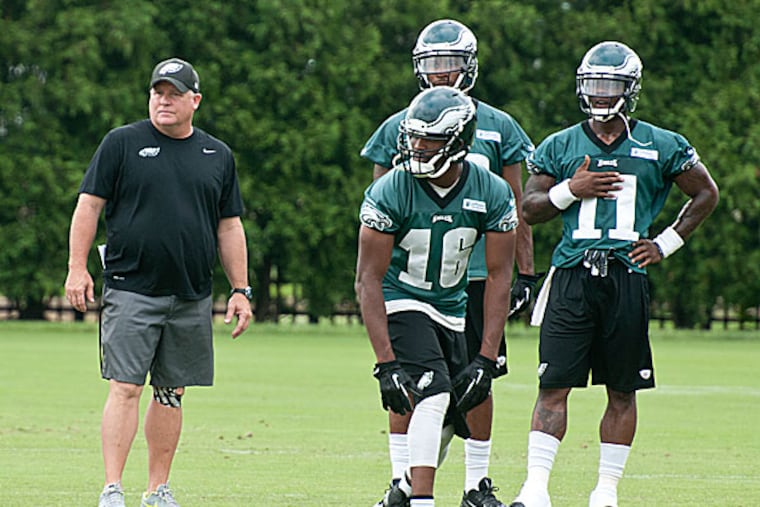Pressing matter for Eagles receivers
They start hitting this week. The Eagles begin training camp on Saturday, and that's what makes it different. That's what separates training camp from mini-camp and rookie camp and an organized team activity - the cumbersome term for a gathering that might resemble passing camp or summer camp or band camp but, per the NFL's collective bargaining agreement, cannot resemble actual football camp because players aren't permitted to tackle each other.

They start hitting this week. The Eagles begin training camp on Saturday, and that's what makes it different. That's what separates training camp from mini-camp and rookie camp and an organized team activity - the cumbersome term for a gathering that might resemble passing camp or summer camp or band camp but, per the NFL's collective bargaining agreement, cannot resemble actual football camp because players aren't permitted to tackle each other.
As of Saturday, though, the Eagles can tackle and hit, and their defensive backs can practice bump-and-run coverage against wide receivers, and their receivers can work on freeing themselves of that coverage. Given the philosophies and theories that informed many of the franchise's player-personnel decisions this offseason, it's particularly important that those receivers hone that skill. It's why the Eagles drafted Jordan Matthews in the second round and Josh Huff in the third, why they re-signed Jeremy Maclin and Riley Cooper, and in part why they were willing to release DeSean Jackson.
Chip Kelly and his assistant coaches have made it clear that they value size in their wide receivers. "A bigger target sometimes for the quarterback can be a good thing," offensive coordinator Pat Shurmur said. It certainly can, particularly in the modern NFL, where the Seattle Seahawks, with their supersize defensive backs and their status as the defending Super Bowl champions, provide the template for shutting down the wide-open passing offenses that are now common around the league.
But the Eagles' preference for bigger receivers is also born out of the measures that their opponents took last season to try to counteract the tempo and unpredictability of Kelly's offense. "It just seems like we're going to get press coverage more," wide receiver coach Bob Bicknell said. "That's what we got - single guy in the middle of the field, and they told both of our receivers, 'We're going to press you.' So it's simple. That's what we have to defeat. Now, they could try to change that, but they didn't last year."
Bicknell, of course, was at the center of perhaps the most controversial in-game moment of the Eagles season: his sideline spat with Jackson during the team's 48-30 loss to the Minnesota Vikings on Dec. 15. The sequence that precipitated Bicknell and Jackson's argument remains telling: Nick Foles underthrew Jackson on a deep pass down the left sideline, but instead of making a play on the ball, Jackson continued drifting toward the end zone, allowing Vikings cornerback Shaun Prater to intercept Foles' pass.
Whether Bicknell had scolded Jackson for insufficient effort on the play is unknown, but in a way it's irrelevant. At 5-foot-10 and 190 pounds, Prater is not a gigantic cornerback by any measure, but Jackson is listed at 5-10 and 178. Even if Jackson had tried to catch Foles' pass or at least prevent Prater from intercepting it, he would have struggled to do so - especially in comparison to, say, Maclin (6-0, 198), Cooper (6-4, 230), Matthews (6-3, 212), or Huff (5-11, 206).
Kelly doesn't just notice those sorts of details; he builds strategies on them. It stands to reason, too, that those four receivers will have an easier time handling press coverage - using their strength and leverage to escape a defender at the line of scrimmage - than Jackson does. In fact, of the 13 wide receivers listed on the Eagles roster, only one is either shorter or lighter than Jackson: Damaris Johnson, who is 5-8 and 175 pounds and is a long shot to see many snaps once the preseason ends. What Kelly and the Eagles are seeking, essentially, is a group of interchangeable wideouts, any of whom could play pretty much anywhere, and they are banking that Matthews and Huff, even as rookies, will meet more of those criteria than Jackson did.
"Versatility is big in our offense for all our receivers," Bicknell said. "You want them all to eventually line up wherever they can line up and run the play we're running from every position."
This is why training camp will be so revealing and important for the Eagles. It represents the coaches' first in-the-flesh opportunity to see how well Matthews, Huff, and several of the team's other receivers fare against aggressive, man-to-man coverage. It's what the Eagles saw last year, and it's likely to be what they see again. It's one reason that the hitting matters so much, and it will be the decisive factor in at least one game this year, maybe the measuring-stick game of their season: Dec. 7, against the Seattle Seahawks.
@MikeSielski